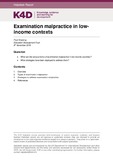| dc.contributor.author | Boateng, Pearl | |
| dc.coverage.spatial | Nigeria | en |
| dc.coverage.spatial | Kenya | en |
| dc.coverage.spatial | South Africa | en |
| dc.coverage.spatial | India | en |
| dc.date.accessioned | 2019-11-14T12:38:52Z | |
| dc.date.available | 2019-11-14T12:38:52Z | |
| dc.date.issued | 2019-11-08 | |
| dc.identifier.citation | Boateng, P. (2019). Examination malpractice in low-income contexts. K4D Helpdesk Report 682. Brighton, UK: Institute of Development Studies. | en |
| dc.identifier.uri | https://opendocs.ids.ac.uk/opendocs/handle/20.500.12413/14771 | |
| dc.description.abstract | This non-standard helpdesk report found that there was little research evidence detailing the types of examination malpractice and even fewer studies focusing on effective strategies to mitigate these issues. Due to the sensitive nature of the topic and the implications for corruption and bribery across entire education systems, this is unsurprising. As a result, from the outset it was agreed with the requester that expert comments and inputs would form the basis of the response to this query. Where evidence was found, this focused on Nigeria, Kenya, South Africa and India. In this report, ‘malpractice’ is defined as purposeful actions intended to influence the marks/grades achieved by individual students or groups of students rather than considering other potential reasons for malpractice (e.g. to influence national policy, working terms and conditions etc.). Malpractice can have different motives and take different forms in different types of examinations (e.g. national assessments for system monitoring which are high stakes for individual schools or regions but not high stakes for individual learners). This report focuses on national exams taken under exam conditions rather than other components that may contribute to the final grades of students (e.g. coursework, School Based Assessment, continuous assessment). As a result, the information presented focuses on national summative examinations in pre-tertiary education. This report has two parts. First, a typology outlining the most common forms of examination malpractice. The typology uses sources from newspaper articles, unpublished conference papers, blogs and other forms of grey literature. Second, a table addressing potential strategies to combat forms of examination malpractice. This was largely made up of expert comments and inputs with some references to research literature. The purpose of this report is to help refine and reframe the policy debate around this issue in Sierra Leone, drawing on evidence from other low-income contexts. | en |
| dc.language.iso | en | en |
| dc.publisher | IDS | en |
| dc.relation.ispartofseries | K4D Helpdesk Report;682 | |
| dc.rights.uri | https://www.nationalarchives.gov.uk/doc/open-government-licence/version/3/ | en |
| dc.subject | Children and Youth | en |
| dc.subject | Development Policy | en |
| dc.subject | Education | en |
| dc.title | Examination Malpractice in Low-Income Contexts | en |
| dc.type | Helpdesk | en |
| dc.rights.holder | © DFID - Crown copyright 2019 | en |
| dcterms.dateAccepted | 2019-11-08 | |
| rioxxterms.funder | Department for International Development, UK Government | en |
| rioxxterms.identifier.project | K4D | en |
| rioxxterms.version | VoR | en |
| rioxxterms.funder.project | 238a9fa4-fe4a-4380-996b-995f33607ba0 | en |

